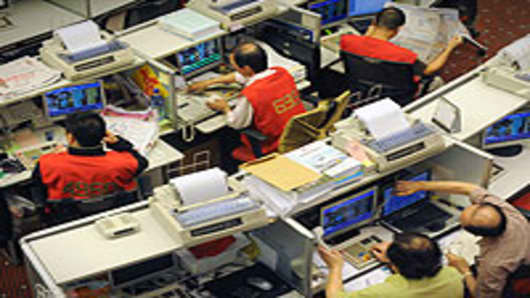Asian stocks saw some heavy selling on Thursday, following signs of an economic soft-patch in the United States. But fund managers and traders remained divided over whether it was time to switch away from stocks and pile into safer, fixed-income securities.
"We've had periods when the market has been too optimistic and periods when the market has been too pessimistic. Now the market is too pessimistic," Andrew Pease, Investment Strategist at Russell Investment Group told CNBC.
Pease said investors shouldn't give up on shares because valuations were still reasonable.
But the trouble is investors need to know which market to put their money in. So far this year, stocks in Asia such as Hong Kong, Australia and India have lagged the returns on the S&P 500.
Institutional money has been betting on a U.S. recovery, while growing increasingly worried about the high inflation, monetary tightening and a slowdown in Asia. But Europe's debt crisis and weak data from the U.S. have the potential to change that narrative.
Pease said he was still sticking to his view that emerging markets would continue to lag developed markets.
"Developed [world] was probably going to stay on this gradual recovery path albeit all these issues going on in the background, and the emerging story is still going to be inflation risk, policy tightening," Pease added.
Data released over the last 2 days showed China' manufacturing sector slowing to a 9-month low, while India's economy posted its slowest growth in 5 quarters.
Others believe the worries about an Asian slowdown have been overdone.
Xavier Denis, Economist and Strategist at Societe Generale Private Banking told CNBC the regional growth story was likely to continue, and recommended going long Asian currencies despite a rebound in the dollar index in May.
"A lot of central banks in Asia remain behind the curve; because of strong growth, Asian currencies need to gain some strength. Structural economic gaps are widening and that will support [Asian] currencies," he said.
But the short interest in Hong Kong stocks is close to a one-year high, signaling those looking to trade stocks over a shorter-term horizon are taking a more bearish posture.
Francis Lun, managing director of the Hong Kong based brokerage Lyncean Holdings, said he was recommending going short.
"Well you have to watch the market. Prior to yesterday it rose for 6 consecutive days, almost 10,000 points so it's overvalued. Then you look at the global purchasing managers index and the world is entering into a slowdown... so it's time to short the market."



